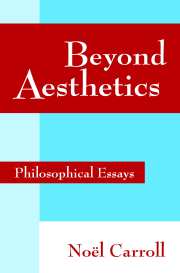Book contents
- Frontmatter
- Contents
- Foreword by Peter Kivy
- Introduction
- PART I BEYOND AESTHETICS
- PART II ART, HISTORY, AND NARRATIVE
- PART III INTERPRETATION AND INTENTION
- PART IV ART, EMOTION, AND MORTALITY
- Art, Narrative, and Emotion
- Horror and Humor
- The Paradox of Suspense
- Art, Narrative, and Moral Understanding
- Moderate Moralism
- Simulation, Emotions, and Morality
- PART V ALTERNATIVE TOPICS
- Notes
- Index
The Paradox of Suspense
Published online by Cambridge University Press: 19 January 2010
- Frontmatter
- Contents
- Foreword by Peter Kivy
- Introduction
- PART I BEYOND AESTHETICS
- PART II ART, HISTORY, AND NARRATIVE
- PART III INTERPRETATION AND INTENTION
- PART IV ART, EMOTION, AND MORTALITY
- Art, Narrative, and Emotion
- Horror and Humor
- The Paradox of Suspense
- Art, Narrative, and Moral Understanding
- Moderate Moralism
- Simulation, Emotions, and Morality
- PART V ALTERNATIVE TOPICS
- Notes
- Index
Summary
THE PROBLEM
It is an incontrovertible fact that people can consume the same suspense fiction again and again with no loss of affect. Someone may reread Graham Greene's This Gun for Hire or re-view the movie The Guns of Navarone and, nevertheless, on the second, third, and repeated encounters be caught in the same unrelenting grip of suspense that snared them on their first encounter. I myself have seen King Kong at least fifty times, and yet there are still certain moments when I feel the irresistible tug of suspense.
However, although the suspense felt by recidivists like me is an undeniable fact, it appears to be a paradoxical one. For there seems to be agreement that a key component of the emotion suspense is a cognitive state of uncertainty. We feel suspense as the heroine heads for the buzzsaw, in part, because we are uncertain as to whether or not she will be cleaved. Uncertainty seems to be a necessary condition for suspense.
However, when we come to cases of recidivism, the relevant readers and viewers know Anne Crowder will stop the onset of world war, that the guns of Navarone will plunge into the sea, and that King Kong will be blown away. After all, we have already read the novel or seen the film; we know how the fiction ends, because we have read it before.
How then can it be possible for us to feel suspense the second, the third, or the fiftieth time around?
- Type
- Chapter
- Information
- Beyond AestheticsPhilosophical Essays, pp. 254 - 270Publisher: Cambridge University PressPrint publication year: 2001
- 4
- Cited by



